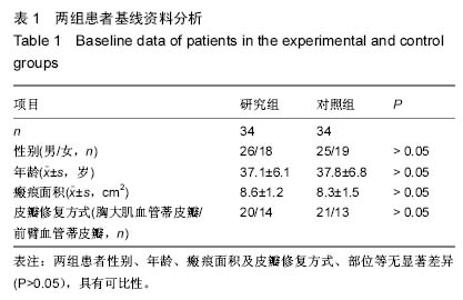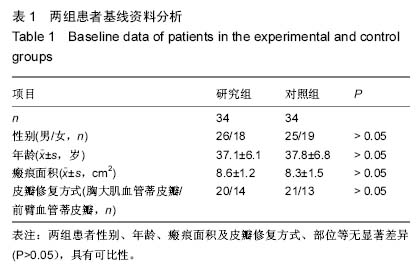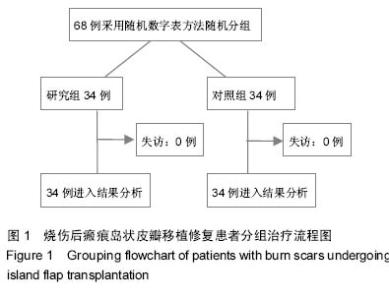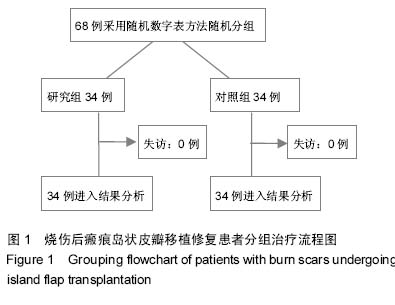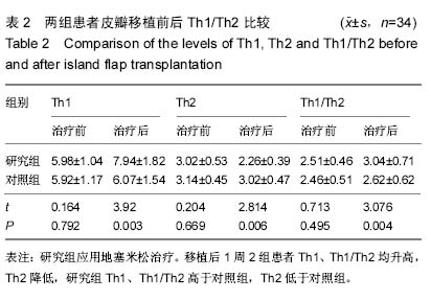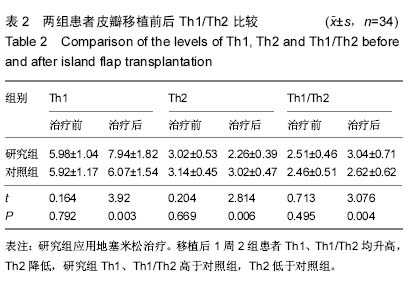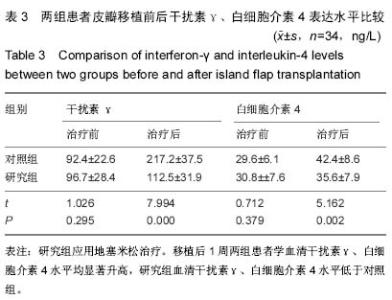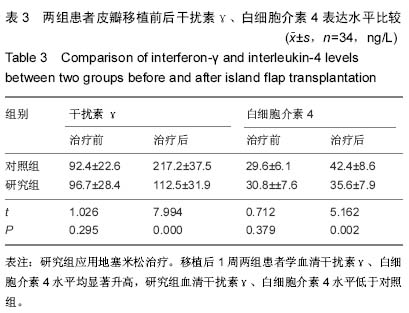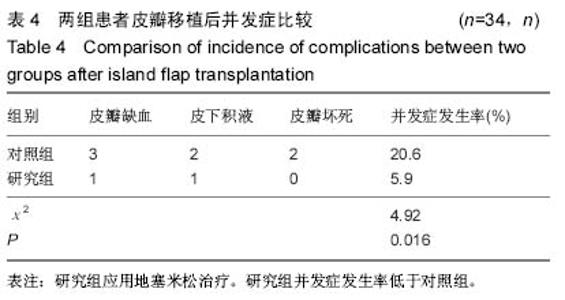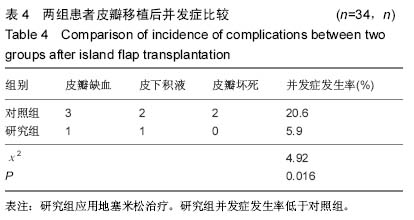| [1] 王达利,王玉明,陈世玖,等.颈浅动脉岛状皮瓣在修复颌面颈部烧伤瘢痕中的应用[J].中华烧伤杂志,2005,21(3):196-198.
[2] 李建和.皮瓣修复治疗手及前臂皮肤烧伤瘢痕的方法及临床疗效[J].中国医学工程,2013,21(4):122.
[3] 彭虹,游云华,梁军.带血管蒂肌皮瓣修复口腔癌术后组织缺损并发症防治对策[J].中国耳鼻咽喉头颈外科,2013,20(6):333-334.
[4] 崔书伟,陈青.表皮生长因子联合地塞米松防治大鼠超长随意型皮瓣缺血坏死的实验研究[J].临床合理用药,2011,4(4A):77-78.
[5] 曹景敏,鲁开化,郭树忠.地塞米松防治皮瓣缺血-再灌注损伤及其机制.中国修复重建外科杂志,2006, 20(6):661-665.
[6] 屈晓东,荔志云,周杰,等.脑外伤大鼠周围血中Th1/Th2比例变化及机制探讨[J].医学研究杂志,2012,41(10):148-151.
[7] 季芳,季雯婷,邱丽华,等.早期和晚期卵巢癌患者初次手术后外周血Th1/Th2和Tc1/Tc2亚群表达的研究[J].中华临床医师杂志:电子版,2013,7(13):6136-6137.
[8] 王世筠,许伟石,曹启栋,等. 抑制应激对烧伤血浆中LPS、前炎症细胞因子和Th1/Th2细胞因子的影响[J].中华烧伤杂志, 2001, 17(3):177-180.
[9] 张华,程琳.陶晓南,等.地塞米松对哮喘大鼠Th2细胞分化的影响[J].中华临床免疫和变态反应杂志,2011,5(2):88-91.
[10] 王万玲,袁凌,谭静,等.综合康复对下肢危重烧伤老年患者膝关节功能的效果[J].中国康复理论与实践,2015,21(1): 117-119.
[11] 孟祥海,王晓琳,李学拥,等.复合皮移植修复烧伤功能部位创面疗效评价[J].中国修复重建外科杂志,2012,26(2):219-222.
[12] 邹立津,张友来,黄耀鹏.33 例前臂骨间后动脉逆行岛状皮瓣治疗重度虎口挛缩的效果分析[J].江西医药,2012,47(12): 1068-1069.
[13] 卜凡玉,薛明宇,芮永军,等.改良前臂骨间背侧动脉逆行岛状皮瓣修复手背部皮肤缺损疗效观察[J].中国修复重建外科杂志, 2014, 28(2):237-239.
[14] 郑大伟,黎章灿,许立,等.双套血供的前臂尺背侧逆行岛状皮瓣修复手部创面[J].中国修复重建外科杂志,2013, 27(11):1402-1403.
[15] 孟彦.胸大肌肌皮瓣在口腔颌面部大面积缺损中的应用[J].山西职工医学院学报,2013,23(4):21-22.
[16] 张学鹏,钟声.口腔颌面部组织缺损应用胸大肌肌皮瓣修复的疗效观察[J].中国美容医学,2012,21(11):6
[17] 蒋雄斌,窦国祥,周韶霞,等.感染、创伤应激时TH1/TH2的平衡变化及其临床意义[J].国外医学.生理、病理科学与临床分册,2000, 20(2):164-167.
[18] 王智,郅克谦,许志鹏,等.灯盏花素对大鼠岛状皮瓣血液流变学和氧化应激的影响[J]. 实用医院临床杂志,2014,11(2):12-15
[19] 汪海涵,王佳,龙腾河.皮瓣移植及免疫调节[J].中国组织工程研究, 2012,16(40):7588-7595.
[20] 陈俊伟,张少然,闫成兰,等. T辅助细胞亚型细胞相关因子在类风湿关节炎发病中的作用[J]. 中国药物与临床, 2012, 12(4): 420-423.
[21] 王建,蒋萍.Th细胞在类风湿关节炎发病作用的研究进展[J].临床与病理杂志,2015,35(2):263-266.
[22] 蒋玉红,王亚秋,孙宽周. 支气管哮喘患者TH细胞的极化状态及临床意义[J].中国当代儿科杂志,2006,8(5):379-381.
[23] 张希炯,孙少华. 外源性肾上腺髓质素对肾脏创伤大鼠Th1/Th2 的调节作用[J].中国组织工程研究与临床康复,2007,11(16): 3078-3081.
[24] 黄海涛,马海涛,王秀云,等.匹多莫德对重症胸部创伤大鼠Th1/Th2 细胞平衡的影响[J].苏州大学学报:医学版,2009, 29 (4): 610-613.
[25] 黄海涛,许期年,王秀云.重症胸部创伤大鼠Th1/Th2平衡变化的实验研究[J].山东医药,2009,49(44):26-27.
[26] 曹景敏,鲁开化,李江.地塞米松防治皮瓣缺血再灌注损伤实验研究[J].中华显微外科杂志,1998,14(2):131-132.
[27] 王小龙,张选奋,秦永红,等.复方地塞米松-氨氯地平凝胶经皮渗透能力及其对缺血随意皮瓣成活的影响[J].中国修复重建外科杂志,2010,24(5):566-570.
[28] 李建军,李庚山,黄从新,等.肿瘤坏死因子-α对血管平滑肌细胞核转录因子κB活性的影响[J].中华心血管病杂志,2001,29(4): 243-245.
[29] 张云香,王家富.血管内皮细胞损伤与肿瘤坏死因子的因果效应[J].中国临床康复,2005,9(27):123-125.
[30] 郑运江,汤耀卿,刘伟,等.肿瘤坏死因子ɑ对血管内皮细胞通透性影响的实验研究[J].外科理论与实践,2009,14(3):323-327.
[31] 庄力,徐勇忠,宋业光.地塞米松在大鼠缺血随意皮瓣中的作用[J].中日友好医院学报, 2003,17(3):163-165.
[32] 曹景敏,鲁开化,郭树忠.地塞米松防治皮瓣缺血-再灌注损伤及其机制[J]. 中国修复重建外科杂志, 2006, 20(6): 661-665.
[33] 张华,程琳,陶晓南,等.地塞米松对哮喘大鼠Th2细胞分化的影响[J].中华临床免疫和变态反应杂志,2011,5(2):88-91.
[34] 尹文,虎晓岷,梁继河,等.地塞米松对创伤性急性肺损伤家兔肿瘤坏死因子-α的干预作用[J].中华实验外科杂志,2001,18(1): 60-61. |
